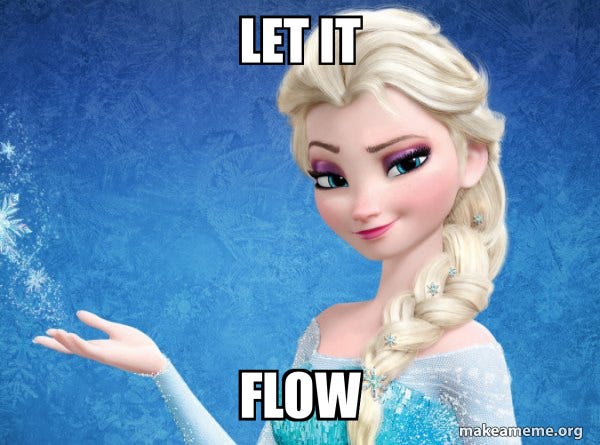Overwhelm! This week, I’m writing about overwhelm and providing tips on how to deal with it and to reduce it.
In Atlas of the Heart, Brené Brown talks about overwhelm as ‘being blown’ - flat out, resources are spent, so long and thanks for all the fish…
When I’m overwhelmed there is certainly no capacity for reflection, because I’m here:
I’d like to say that when I’m overwhelmed I envisage myself as a vase that is literally overflowing; there is no point trying to add anything to it as that will just add to the overwhelm. A bit of visualisation as calm flowing water from a vase may work for a bit, but to move through overwhelm we need some space and time so that it can flow out; so that some capacity can be created. In fact, the meaning of ‘whelm’ is ‘to well up or flow.’
Here is my poem for overwhelm:
Stay in bed
Numb head
Enough said.
CLEARLY I was too overwhelmed to spend much time on that. Let’s face it, it’s not my greatest work. Of course, when we are overwhelmed there is no way we can create our greatest work. So whilst we are swirling around in such anchor-less moments, what can we do?
Whenever I feel ungrounded, I always return to a very simple grounding technique using my senses of 5-4-3-2-1; 5 things I can see, 4 things I can hear, 3 things I can touch, two things I can smell and one thing I can taste.
Sight
I’m tempted to go down the whole ‘limit your social media and news intake’ route. Which I have to say, has definitely worked for me. However, let’s think about other visual sources that create overwhelm.
Clutter creates stress, releasing cortisol into your system. Whilst cortisol is necessary (it facilitates your fight/flight response), over time your body can get used to having too much cortisol in your blood which leads to more inflammation. It also decreases your white blood cells (needed for fighting infection) and when these are suppressed it is harder to fight off viruses. If you would like to find out more about decluttering have a listen to this podcast episode with a professional declutterer.
Sound
Stress, stress, stress, stress, stress. Are you feeling more anxious now after reading that?
Compare your feelings to how you feel after reading this: Calm, calm, calm, calm, calm.
My next point is to think about what you are saying and how.
Saying “I feel so overwhelmed” is a reactive comment. Saying ‘I want to feel calmer’ is a proactive comment. The former may leave you feeling stuck, out of control, whilst the latter leans toward a growth mindset which may lead you to asking yourself, ‘What can I do now that would help me feel more calm?’
Listening to classical music is also calming if you pick the right piece. Try Air on a G string by J.S. Bach, for example.
Touch
In the last newsletter I included a video about EFT tapping to release stress and overwhelm. I also suggest this hug exercise (it’s at about 12 mins into the video) to my clients which can help to give a sense of containment. `Giving a sense of containment to the body allows the feelings you are feeling to flow and then settle. Emotions are energy in motion (e-motion) so:
Smell
Smells can instantly affect the way we feel. Think about how you recoil in disgust at the smell of an un-emptied bin for example (I could think of worse, but let’s try and keep it pleasant). You don’t think about how disgusted you feel before you recoil; your olfactory system has sent a message to your amygdala which has kicked in with a ‘flee’ response to your legs before you can utter ‘yeuch’.
So you can use this to your advantage right now. Personally, my go to is eucalyptus oil if I want a brain reset, but lavender, vetiver, orange blossom, rosemary, sage all have their benefits in helping you feel better.
There are even studies which suggest that the vapour of bergamot and eucalyptus killed the influenza virus after 10 minutes, which is an added bonus in the winter months.
Taste
Vitamins A, B6, C, D, E, zinc and flavonoids are all instrumental in building and maintaining a robust immune system which helps your vitality, capacity and resilience. Sugar also adds stress to you body, so limiting that will help. So boring, but so true.
All these small little things impact our daily live which build up into overwhelm, but the good news is we have things at our finger tips which are in our control.
Boundaries
I don’t think I can talk about overwhelm without talking about boundaries, and I’ll happily write an additional post on this because it is such a massive topic. Boundaries can really help with overwhelm. If you find it difficult to say no, are worried about what someone else will think, have an emotional hangover when you do set a boundary, then they may be an issue for you.
Why?
When you grow up in an environment that does not reflect back to you who you truly are, then it is impossible to gain a solid sense of self. Without a solid sense of self, you have no clue what you need to protect, defend or share. It’s like when people talk about being a chameleon in different situations - adaptive to the environment.
When someone has a sense of self they can be responsive to the environment, not adaptive. Adaptive requires you to modify yourself for the conditions around you, responsive requires you to consider your self - your values, your limits, your needs, and then act accordingly.
When I set a boundary with someone I am sharing with them how I want to be treated for my own physical, emotional and mental safety. They can of course decide that they don’t want to treat me in that way and that’s where consequences come in.
Consequences are things that I will do in order to keep myself safe. This is different to punishment. Punishment is about exercising external force in order to control a situation or person and there is a power differential at play.
Consequence is: I get that you are going to behave in that way, but it doesn’t work for me, so if you continue to insist on behaving in that way (which I find damaging) then I will take myself away in order to remain safe. To the person on the receiving end, if they are not willing to look at their own behaviour, consequences can look like punishment.
I’ll write more on this in the future, but don’t want to leave you hanging, so if you want to find out more I recommend having a look at this. I’d also suggest checking out my podcast episode with Kari Kwinn who wrote a book called Better Boundaries and can be found as
on Substack.Thanks again for signing up to ‘Permission to Feel’ newsletters. Your contribution to my work is invaluable.
That’s it for now, ‘til next time.
Jacky x






